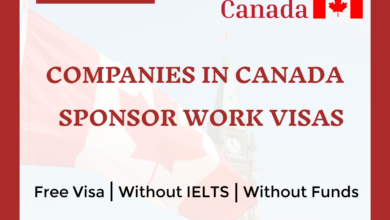Top 10 Reasons Why Canadian Employers Are Not Offering You a VISA Sponsorship Job
Securing a job in Canada and obtaining VISA sponsorship is a goal for many, but it’s not always as straightforward as it seems.
While there might be multiple opportunities, there could be several reasons why Canadian employers aren’t extending job offers to international candidates seeking sponsorship.
Here, we delve into the top 10 reasons and explore how you can navigate these challenges effectively.
#1. Opting for Jobs Wanted by Canadian Residents
Imagine competing for a prestigious job that’s already in high demand among local professionals.
Canadian employers often prioritize candidates who are already residing in the country for these roles, making it a steep uphill battle for those abroad.
A better approach is to focus on positions that have a dearth of local applicants and are more open to international talent.
#2. Mismatched CV to Work Experience
One of the most common pitfalls is sending out generic CVs that don’t sync well with the specific job requirements.
Your CV should be more than just a laundry list of experiences; it should be tailored to each role you’re applying for.
Highlight relevant achievements and skills that mirror the job description, proving you’re the perfect fit.
#3. Underestimating the Importance of Language Proficiency
Effective communication is paramount in the Canadian job market, especially in English and French-speaking regions.
If your language skills fall short of the mark, employers may worry about your integration into the workforce.
Boost your language proficiency by enrolling in language courses or language exchange programs.
Highlight language certifications or experiences on your CV to underline your dedication to improving your language skills.
#4. Preference for Domestic Talent
Canadian employers often lean towards hiring domestic talent due to their familiarity with the local culture, language, and regulations.
To stand out, emphasize your unique skills and international experiences that can contribute a fresh perspective to the company.
Tailor your application materials to demonstrate how your diverse background can be an asset to their team.
#5. Limited Job Opportunities in Sponsorship-Eligible Fields
Some industries might offer fewer job opportunities for international candidates requiring sponsorship.
It’s crucial to research fields that are more open to sponsorship and direct your job search towards those sectors.
Network within those industries to gain insights and potentially uncover hidden opportunities.
#6. Reluctance Due to Visa Sponsorship Complexity
The process of VISA sponsorship can be complex, which might deter employers who are unfamiliar with it.
To overcome this hurdle, consider reaching out to companies that have prior experience with sponsorship or explore opportunities in LMIA-exempt categories, where hiring foreign workers is more streamlined.
#7. Risk and Uncertainty Surrounding Visa Sponsorship
Hiring international candidates involves additional administrative work and potential risks for employers.
Some companies might hesitate to sponsor visas due to uncertainties in the immigration process.
To alleviate their concerns, demonstrate your commitment by communicating openly about your visa status and showing your willingness to cooperate throughout the sponsorship process.
#8. Relying Solely on a CV and Cover Letter
While a CV and cover letter are essential, they might not be enough to leave a lasting impression.
Stand out from the crowd by creating a professional portfolio that showcases your work samples, projects, and accomplishments.
Additional documents such as IELTS scores and relevant certifications can provide a comprehensive view of your capabilities.
#9. Restricting Your Job Search to a Single Platform
Relying solely on one job search platform limits your exposure to potential opportunities. Job postings are scattered across various websites and platforms.
Expand your search horizons by exploring multiple job sites, company career pages, and industry-specific platforms. Networking and attending job fairs can also open doors to new prospects.
#10. Failing to Follow Up Effectively After Applying
Patience is key when awaiting a response after submitting your job application.
While it’s natural to be eager for a reply, bombarding employers with follow-up calls or emails can be counterproductive.
Instead, send a courteous follow-up email after a reasonable period, expressing your continued interest.
A proactive approach while waiting can set you apart from other applicants.
Platforms to Find NOC-Certified Jobs in Canada
When it comes to finding employment in Canada, utilizing the right job search platforms can make a significant difference in your job hunt.
Here are some of the top Canadian job sites that can help you secure opportunities faster:
● Indeed Canada (www.indeed.ca): One of the most popular job search engines, Indeed aggregates job listings from various sources, including company websites and job boards. You can filter jobs by location, salary, job type, and more.
● LinkedIn (www.linkedin.com/jobs): As a professional networking platform, LinkedIn offers an extensive range of job postings. You can connect with professionals, follow companies, and receive personalized job recommendations based on your profile.
● Workopolis (www.workopolis.com): Workopolis is a well-established job search site in Canada, offering a broad spectrum of job listings across different industries and locations.
● Monster Canada (www.monster.ca): Monster is known for its user-friendly interface and a wide range of job opportunities. You can create a profile, upload your resume, and apply for jobs directly.
● Glassdoor (www.glassdoor.ca): Glassdoor not only provides job listings but also offers insights into company reviews, salaries, and interview experiences shared by employees.
● Job Bank (www.jobbank.gc.ca): Managed by the Canadian government, Job Bank provides comprehensive job listings and labour market information. It’s a reliable resource for both Canadian residents and international job seekers.
● Eluta (www.eluta.ca): Eluta specializes in tracking new jobs directly from employer websites. You can search for jobs by locality, company and keywords.
● WowJobs (www.wowjobs.ca): WowJobs aggregates job postings from various sources, making it easy to find opportunities across different sectors.
● SimplyHired Canada (www.simplyhired.ca): Similar to Indeed, SimplyHired offers a wide range of job listings from various sources.
● CareerBuilder Canada (www.careerbuilder.ca): CareerBuilder is another job search platform that provides access to job listings, career advice, and resources to help you with your job search.
NOC Jobs Opportunities to Look Out For
The Canadian job market offers certain positions that are more accessible to international candidates, often referred to as “alien-friendly” jobs.
These roles typically have lower entry barriers and may not require extensive experience or specialized skills.
Here are some examples of NOC (National Occupational Classification) jobs in Canada that are considered more suitable for international job seekers:
With Canada’s ageing population, the demand for caregivers is on the rise. Caregivers assist elderly or disabled individuals in their homes, providing essential support and companionship.
Restaurants and cafeterias are frequently in need of dishwashers to maintain cleanliness in their kitchens. This entry-level job offers an opportunity to gain experience in the culinary industry.
#3. Kitchen Helper (NOC 65201)
Similar to dishwasher roles, kitchen helpers support chefs and cooks in preparing and maintaining the kitchen area. It’s a chance to learn about different cuisines and culinary practices.
#4. Room Attendant (NOC 65310)
In the hospitality sector, room attendants are responsible for cleaning and maintaining hotel rooms to ensure a pleasant guest experience. This role can provide valuable customer service skills.
#5. General Laborers (NOC 75110)
Various industries, such as construction and manufacturing, require general labourers for tasks that don’t demand specialized skills. These roles often involve physical work and can serve as a stepping stone for career growth.
#6. Exhibit Cleaner (NOC 65311)
Museums, galleries, and exhibition spaces hire exhibit cleaners to maintain the cleanliness and appearance of exhibits. Attention to detail and a passion for art and culture can be advantageous in this role.
These “alien-friendly” jobs are a great starting point for international job seekers looking to gain experience and establish themselves in Canada.
While these roles might not require advanced qualifications, they can provide valuable skills, networking opportunities, and a foothold in the Canadian job market.
Sometimes, you may get employment for a reputed Employer in Canada, and get a visa denial. Read on to know why such may occur.
Work Visa Common Rejection Reasons
Work visa applications can be rejected for various reasons. Some common factors that lead to rejection include:
● Lack of Proof of Intent: Failing to demonstrate a clear and genuine intent to return to your home country after the visa expires.
● Insufficient Supporting Documents: Not providing the required documentation to support your application, such as educational certificates, job offers, or financial statements.
● Inadequate Language Proficiency: If your language skills don’t meet the required level for the job or communication in Canada.
● Incompatibility with LMIA (Labour Market Impact Assessment) Process: If your job offer is not supported by a positive LMIA, which is required for certain types of work visas.
● Lack of Relevant Work Experience: If your work experience doesn’t align with the job you’re applying for.
● Criminal Record or Health Issues: If you have a criminal record or health issues that make you inadmissible to Canada.
How to Re-apply for Visa after a Refusal
If your work visa application has been refused, you can take steps to improve your chances for the next application:
● Understand the Reason for Refusal: Carefully review the refusal letter to understand why your application was rejected. This will help you address the specific issues.
● Gather Additional Documents: Collect any missing or additional documents that could strengthen your application. This might include clarifying your intent, providing more comprehensive proof of finances, or addressing language proficiency.
● Seek Professional Advice: Consult with an immigration consultant or lawyer who specializes in Canadian immigration. They can provide expert guidance on how to address the issues that led to your refusal.
● Reapply with Care: When reapplying, make sure your application is thorough, accurate, and well-prepared. Address the previous concerns and present your case clearly and convincingly.
The 4 Steps for Reversing a Refusal
Reversing a refusal requires a strategic approach. Follow these 4 steps for possible solution:
Request the notes from the immigration officer on your previous application. These notes will provide insights into the reasons for the refusal.
Book a consultation with an immigration consultant to review the refusal notes and strategize for your new application.
Prepare a comprehensive list of documents recommended by your consultant to strengthen your application. This may include a well-crafted submission letter.
Submit your application, ensuring that all documents are accurate and complete. Address the previous refusal points and provide clear evidence to support your eligibility.
How do I know if I need a work visa to work in Canada?
If you’re not a Canadian citizen or permanent resident, you likely need a work visa to work in Canada. Certain exemptions and agreements may apply, so it’s essential to check the specific requirements based on your situation.
What is an LMIA, and when is it required for a work visa?
An LMIA (Labour Market Impact Assessment) is a document that shows whether a Canadian employer can hire a foreign worker for a specific job. It’s required for most work visa applications, demonstrating that there’s a genuine need for a foreign worker when no Canadian is available.
Can I apply for a work visa without a job offer in Canada?
In most cases, having a job offer from a Canadian employer is a prerequisite for obtaining a work visa. However, some categories of work visas, like International Experience Canada (IEC), allow eligible candidates to apply without a job offer.
How do I prove my language proficiency for a Canadian work visa?
Language proficiency can be proven through language tests like IELTS or CELPIP for English, and TEF or TCF for French. Different visa categories may have specific language requirements, so check the details of the visa you’re applying for.
Before applying or reapplying for a visa-sponsored job in Canada, make sure you meet at least 60 per cent of the requirements; I’ll secretly say you complete it 100%
You need this employment status from these employers and can’t work in Canada until you receive your work permit.
However, certain visa categories, like the IEC working holiday visa, may allow you to work while your application is processed.
You can reapply after a refusal. It’s important to carefully review the refusal reasons, address any issues, and strengthen your application before reapplying.
Consulting with an immigration professional can be helpful in this process.





